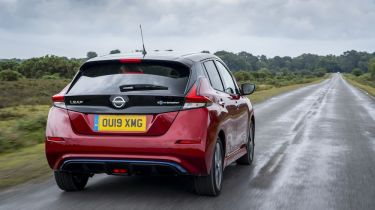Nissan Leaf review: running costs & insurance
The Nissan Leaf should be equally cheap to buy and run – it doesn’t have the best residuals, though
|
Insurance group |
Warranty |
Service intervals |
Annual company-car tax cost (20%/40%) |
|
21-28 |
5yrs/60,000 miles |
1yr/18,000 miles |
From £114/£228 |
Although it's no longer at the cutting edge technology-wise, the Nissan Leaf remains a well priced electric family car, starting at just under £29,000 as of early 2023. That said, it’s hard to ignore that the MG4 is cheaper still, with a longer range and faster charging – not to mention its more enjoyable driving experience.
Leaf finance deals are competitive, though, so be sure to check out monthly payments when judging the car’s affordability alongside rivals. With Benefit-in-Kind tax fixed at just 2% on all electric cars until at least April 2024, the Leaf and its peers offer incredible value for company-car drivers, too.
The cost of charging the Leaf will vary depending where you charge it and your electricity tariff. Most EV drivers charge their cars at home, so assuming you’re paying the average domestic rate of around 34p per kWh, the basic Leaf will cost just over £13 to fully charge, while the e+ will be around £20 – or less on off-peak rates.
Nissan Leaf insurance group
The Leaf starts in insurance group 24, which is only a little higher than the rating for a high-specification Ford Focus diesel. Even a range-topping Leaf e+ in Tekna trims sits in group 28, though, so premiums should be reasonable for most drivers. Nissan offers its own insurance policies, which come with a range of benefits, but you can use your own insurance provider if you prefer. As with any car-insurance policy, you should shop around for the best deal.
Warranty
The Leaf’s manufacturer warranty is pretty comprehensive. All electric drive components are covered by a five-year/60,000-mile guarantee, but ‘standard’ components are only covered for three years/60,000 miles. The warranty can be extended for an extra fee. There’s also a lithium-ion battery warranty, which protects against capacity loss for eight years or 100,000 miles. The policy will kick in if the maximum capacity drops below nine bars, out of the 12 that are displayed on the Leaf’s screen.
Servicing
The Nissan Leaf needs to be serviced every 18,000 miles. Those intervals are spread further than for many petrol or diesel cars, due to the smaller number of moving parts in an electric car. Although you can have your Leaf serviced wherever you like in accordance with Nissan’s schedule to keep the warranty valid, the reality is that at this moment in time, relatively few independent garages are geared up to work on electric cars. To mitigate this, Nissan offers a service contract. It also provides a number of useful incentives to encourage you to keep servicing your car at one of its dealers, including free breakdown cover.
Road tax
Electric cars are exempt from road tax (VED) in the UK until 2025, as they emit no carbon-dioxide at the tailpipe. The Leaf can also enter the London Congestion Charge Zone (CCZ) for free – again, until 2025.
Depreciation
Electric cars typically hold onto a substantial amount of their initial asking price, but this isn’t the case for the Nissan Leaf; the latest industry figures suggest the electric hatchback will retain just 37-41% of its value over three years and 36,000 miles. In comparison, an MG4 will hold onto anything between 48 and 51% of its asking price over the same period. On a lighter note, this means there are plenty of good deals to be found on used on Nissan Leafs.




